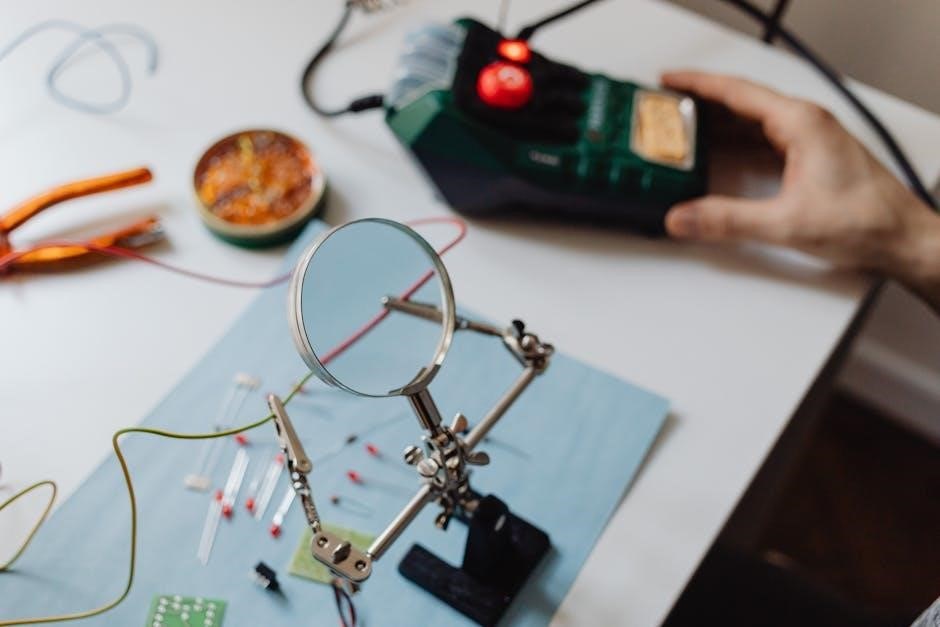Electrical Apprenticeship Test Questions and Answers PDF: A Comprehensive Study Plan
Navigating the IBEW/NJATC exam requires focused preparation. This guide details resources – including PDFs – to master aptitude‚ algebra‚ and reading comprehension skills for success.
Understanding the IBEW/NJATC Aptitude Test
The IBEW/NJATC Aptitude Test‚ also known by various names like the Electrician Apprentice Test or NJATC Aptitude Test‚ serves as a crucial gateway to a rewarding electrical career. This standardized assessment evaluates candidates’ potential for success within the rigorous IBEW electrician apprenticeship program.
It’s designed to gauge cognitive abilities‚ not necessarily pre-existing electrical knowledge‚ though foundational math skills are essential. The test comprises 69 multiple-choice questions‚ focusing on areas like algebra and reading comprehension. Passing this test is a primary step‚ often followed by an interview‚ to secure a coveted apprenticeship position. Preparation is key‚ and numerous resources‚ including practice tests and study guides‚ are available.
Test Names and Variations
The IBEW aptitude test isn’t universally labeled with a single name. Candidates will encounter it referenced as the NJATC Aptitude Test‚ the Electrician Apprentice Test‚ or the Electrician Pre-Apprenticeship Test. It’s also known as the Electrical Training Alliance Aptitude Test‚ often linked to NECA (National Electrical Contractors Association);
Despite these variations‚ the core assessment remains consistent across different locals and regions. Regardless of the specific title‚ the test aims to evaluate a candidate’s aptitude for the demands of an electrical apprenticeship. Resources and preparation materials often cater to all these names‚ ensuring comprehensive coverage for prospective apprentices.
Purpose of the Electrical Apprenticeship Test
The primary goal of the IBEW Aptitude Test is to determine a candidate’s suitability for the rigorous demands of an electrician apprenticeship program. It assesses fundamental skills – not necessarily existing electrical knowledge – to predict success in training. The test identifies individuals possessing the cognitive abilities needed to grasp complex concepts and problem-solving techniques inherent in the electrical trade.
Passing the test signifies a candidate’s potential to thrive in a structured learning environment and contribute effectively to a team. It’s a crucial step in the selection process‚ helping the IBEW identify promising apprentices.
Core Test Sections

The IBEW/NJATC Aptitude Test primarily focuses on two key sections: Algebra and Functions‚ and Reading Comprehension. The Algebra and Functions portion evaluates mathematical reasoning and problem-solving abilities‚ essential for electrical calculations. This section comprises a significant portion of the 69 multiple-choice questions.
Reading Comprehension assesses the ability to understand written information‚ interpret diagrams‚ and follow instructions – vital for safety protocols and technical manuals. While not explicitly electrical‚ these core skills are foundational for success within the apprenticeship program and beyond;
Algebra and Functions
The Algebra and Functions section is a critical component of the IBEW aptitude test‚ demanding strong mathematical skills. Expect questions covering fundamental algebraic principles‚ including solving equations‚ inequalities‚ and working with functions. Proficiency in these areas is crucial‚ as electrical work frequently involves calculations related to voltage‚ current‚ and resistance.

Preparation should focus on mastering basic arithmetic‚ order of operations‚ and translating word problems into mathematical expressions. Numerous practice tests and study guides specifically target these skills‚ offering targeted practice to boost confidence and accuracy before exam day.
Reading Comprehension
Strong reading comprehension is vital for success on the IBEW aptitude test. This section assesses your ability to understand and interpret written information‚ often presented in the form of work-related passages or technical instructions. Expect questions that test your ability to identify main ideas‚ draw inferences‚ and understand complex terminology.
Effective preparation involves practicing with diverse texts and focusing on active reading strategies. Pay close attention to details‚ and practice summarizing key information. Improving reading speed and accuracy will significantly enhance your performance on this crucial section of the exam.
Key Subject Areas to Focus On
Prioritize mastering core subjects for optimal IBEW test performance. Foundational basic math skills are essential‚ including fractions‚ decimals‚ percentages‚ and algebraic equations. Equally important is a grasp of electrical theory fundamentals‚ encompassing concepts like Ohm’s Law‚ series and parallel circuits‚ and power calculations.
Don’t underestimate the importance of understanding electrical concepts such as voltage‚ current‚ resistance‚ and wattage. Dedicated study in these areas‚ alongside consistent practice with relevant questions‚ will significantly boost your confidence and increase your chances of passing the aptitude test.
Basic Math Skills
A strong mathematical foundation is crucial for success on the IBEW aptitude test. Expect questions involving fractions‚ decimals‚ and percentages – mastering conversions is key. Algebraic equations will also appear‚ requiring you to solve for unknown variables.
Furthermore‚ proficiency in basic arithmetic – addition‚ subtraction‚ multiplication‚ and division – is non-negotiable. Many electrical calculations rely on these fundamentals. Practice applying these skills to word problems‚ as the test often presents scenarios requiring mathematical interpretation. Consistent practice will build speed and accuracy.
Electrical Theory Fundamentals

While the IBEW test isn’t heavily focused on advanced electrical theory‚ a basic understanding is beneficial. Familiarize yourself with Ohm’s Law (V=IR) and its applications – voltage‚ current‚ and resistance are core concepts. Understand series and parallel circuits and how to calculate total resistance in each configuration.
Knowledge of electrical power (P=VI) and units like watts‚ volts‚ and amps is also helpful. Don’t expect complex circuit analysis‚ but a grasp of these fundamentals demonstrates aptitude. Focus on practical applications rather than intricate theoretical details.
Understanding Electrical Concepts

The IBEW aptitude test assesses your ability to learn‚ not necessarily your existing electrical knowledge. However‚ grasping fundamental concepts aids comprehension. Key areas include understanding AC and DC current‚ and the difference between them. Familiarize yourself with basic electrical safety principles‚ like the importance of grounding and insulation.
Recognizing common electrical symbols – resistors‚ capacitors‚ inductors – can be useful when interpreting diagrams. While detailed knowledge isn’t crucial‚ a foundational understanding of these concepts will boost your confidence and problem-solving skills during the assessment.
Types of Questions Encountered
Expect a variety of question formats on the IBEW aptitude test. The majority – 69 questions – are multiple-choice‚ covering areas like math‚ reading comprehension‚ and spatial reasoning. Diagram interpretation is also prominent; you’ll need to analyze electrical schematics and identify components or understand circuit flow.
These diagrams aren’t about deep electrical expertise‚ but assessing your ability to extract information from visual representations. Practice tests will expose you to these formats‚ helping you build speed and accuracy. Familiarity with these question types is key to maximizing your score.
Multiple-Choice Questions
The IBEW aptitude test heavily relies on multiple-choice questions. These assess a broad range of skills‚ including algebra‚ functions‚ and reading comprehension. Expect questions testing basic mathematical operations‚ problem-solving‚ and the ability to interpret written information accurately.
Strategic test-taking is crucial; eliminate obviously incorrect answers to improve your odds. Practice with sample questions to build speed and confidence; Understanding the question’s intent is vital – carefully read each option before selecting your answer. Mastering this format is essential for a strong score.

Diagram Interpretation
A key component of the IBEW test involves interpreting diagrams. While the provided information suggests limited direct electrical questions‚ the aptitude test may present visual reasoning challenges. These could include understanding schematics‚ recognizing patterns‚ or identifying relationships within graphical representations.
Developing strong spatial reasoning skills is beneficial. Practice analyzing various diagrams to quickly grasp their meaning. Focus on identifying key components and understanding how they interact. Although not explicitly electrical‚ the ability to decipher visual information is a valuable asset for success on the exam.
Resources for Test Preparation
Numerous resources exist to aid in IBEW test preparation. Beyond PDF study materials‚ explore free online practice tests‚ such as those offered by JobTestPrep‚ to familiarize yourself with question formats. IBEW aptitude test study guides provide structured learning‚ while Quizlet offers flashcards for on-the-go review.
Consider non-PDF‚ self-scoring practice tests and electrician math practice tests for comprehensive skill development. Remember the test focuses on aptitude‚ so broaden your study methods. Utilizing a variety of tools maximizes your chances of success and builds confidence before exam day.
Free Practice Tests Online
Accessing free practice tests is crucial for IBEW preparation. JobTestPrep provides hand-picked IBEW aptitude practice questions‚ offering a glimpse into the test’s style and difficulty. Several websites host free electrician apprentice practice tests‚ allowing you to assess your strengths and weaknesses.
These tests often cover core areas like algebra and reading comprehension. While a single free test is helpful‚ consider supplementing with full-length practice exams available in preparation courses. Consistent practice builds familiarity and improves your speed and accuracy‚ ultimately boosting your confidence on test day.
IBEW Aptitude Test Study Guides

Comprehensive study guides are essential for mastering the IBEW exam. Look for resources that specifically address the NJATC Aptitude Test‚ covering all 69 multiple-choice questions. These guides should break down core subjects like algebra‚ functions‚ and reading comprehension into manageable sections.
Effective study guides provide detailed explanations‚ practice problems‚ and answer keys. Beyond traditional guides‚ explore online resources‚ self-scoring tests‚ and flashcards for flexible learning. A well-structured study guide‚ combined with consistent practice‚ significantly increases your chances of success on the aptitude test.
Flashcards and Mobile Study Tools
Leverage the power of flashcards and mobile apps for efficient studying. These tools allow for on-the-go review of key concepts‚ formulas‚ and vocabulary essential for the IBEW aptitude test. Focus on creating or finding flashcard sets covering algebra‚ functions‚ and reading comprehension strategies.
Mobile study tools offer convenience and flexibility‚ enabling you to maximize study time during commutes or breaks. Utilize apps that provide practice quizzes‚ progress tracking‚ and personalized learning paths. Combining flashcards with mobile apps creates a dynamic and effective study system‚ boosting your confidence and preparedness.
Finding PDF Study Materials
Locating relevant PDF resources is crucial for targeted preparation. A focused online search using keywords like “IBEW aptitude test PDF‚” “NJATC practice test PDF‚” or “electrician apprentice study guide PDF” can yield valuable results. Explore websites specializing in electrician training and apprenticeship programs‚ as they often offer downloadable study materials.
Be cautious when downloading PDFs from unfamiliar sources; prioritize reputable websites to ensure accuracy and quality. Remember that while PDFs can be helpful‚ they shouldn’t be your sole study method. Supplement PDF materials with practice tests and other resources for a comprehensive approach.
Locating IBEW Test Question PDFs
Finding authentic IBEW test question PDFs can be challenging. While numerous websites claim to offer them‚ verifying their accuracy is paramount. JobTestPrep is specifically mentioned as a source for IBEW test preparation materials‚ potentially including PDF practice questions. Searching online forums dedicated to electricians and apprenticeships may also uncover shared resources‚ but exercise caution.
Remember that the IBEW aptitude test format remains consistent across locals‚ but the specific content may vary. Prioritize resources that align with the 69 multiple-choice question format and cover algebra‚ functions‚ and reading comprehension.

Evaluating the Quality of PDF Resources
Assessing the reliability of IBEW test question PDFs is crucial for effective preparation. Look for resources that closely mimic the official test’s format – 69 multiple-choice questions – and content areas: algebra‚ functions‚ and reading comprehension. Check for recent publication dates‚ as test content can evolve.
Beware of PDFs with numerous errors or outdated information. Cross-reference questions with other study materials and online resources. Prioritize PDFs from reputable test preparation companies like JobTestPrep‚ or those shared by verified apprentices who have recently passed the exam.
Strategies for Success

Maximize your IBEW aptitude test performance with targeted strategies. Consistent practice using realistic PDF materials is paramount. Focus on mastering basic math skills and understanding fundamental electrical concepts‚ even if your test lacked direct electrical questions.
Effective time management is vital; simulate test conditions during practice to build speed and accuracy. Analyze your performance on practice tests‚ identifying weak areas for focused review. Utilize flashcards and mobile study tools for on-the-go reinforcement. Remember‚ the test assesses aptitude‚ not prior electrical experience.
Time Management During the Test
Efficient time allocation is crucial for completing the 69 multiple-choice questions. Practice tests should emphasize pacing yourself under timed conditions‚ mirroring the actual exam environment. Avoid spending excessive time on any single question; if stuck‚ mark it and return later.
Prioritize sections based on your strengths – tackle easier questions first to build confidence and secure points. Regularly check the time remaining to ensure you’re on track. Don’t leave any questions unanswered‚ as there’s no penalty for guessing. Strategic time management maximizes your chances of success.
Practice Test Analysis and Improvement
Thoroughly review each practice test to identify areas of weakness. Don’t just check your score; analyze why you missed questions. Were they due to mathematical errors‚ comprehension issues‚ or lack of electrical knowledge?
Focus your subsequent study on these specific areas. Utilize study guides and flashcards to reinforce concepts. Repeat practice tests to track your progress and ensure improvement. JobTestPrep offers detailed analysis tools. Consistent review and targeted practice are key to maximizing your score and building confidence for the actual IBEW aptitude test.
Understanding Scoring and Passing Criteria

The IBEW/NJATC aptitude test consists of 69 multiple-choice questions. While a specific passing score isn’t universally published‚ performance is ranked against other applicants. A higher score significantly increases your chances of securing an interview.
Focus on maximizing your overall score‚ rather than aiming for a fixed number. Strong performance in algebra and reading comprehension is crucial. Practice tests‚ like those from iPREP and JobTestPrep‚ help gauge your standing. Remember‚ the test assesses aptitude‚ not prior electrical experience‚ so focus on foundational skills.
What to Expect After the Test
Following the IBEW aptitude test‚ a waiting period ensues before results are communicated. Successful candidates are contacted for an interview‚ typically conducted by local union representatives or NECA contractors.
The interview assesses your work ethic‚ problem-solving skills‚ and suitability for the apprenticeship program. Expect questions about your motivation‚ career goals‚ and willingness to learn. Some locals may not ask electrical-specific questions during this initial stage‚ focusing instead on personal attributes. Preparation is key to showcasing your potential and securing a coveted apprenticeship position.
Interview Process
The interview stage is crucial for securing an apprenticeship. Expect a panel interview with union representatives and/or NECA contractors‚ focusing on your character and aptitude. Questions will explore your work ethic‚ problem-solving abilities‚ and commitment to the program.
While technical knowledge isn’t always the primary focus‚ demonstrating a genuine interest in the electrical trade is vital. Be prepared to discuss your career aspirations and why you’re a good fit. Some interviews may surprisingly lack direct electrical questioning‚ prioritizing personal qualities and a strong desire to learn.
Apprenticeship Program Details
Successful candidates enter a structured‚ five-year program. This combines on-the-job training with classroom instruction‚ overseen by the IBEW and NJATC. Apprentices receive progressively challenging assignments‚ gaining practical experience under skilled electricians.
Classroom studies cover electrical theory‚ National Electrical Code (NEC) requirements‚ safety protocols‚ and related subjects. Apprentices earn while they learn‚ with wages increasing annually as their skills develop. Completion leads to journeyman status‚ opening doors to diverse career opportunities within the electrical industry and union membership.
Preparing for the Interview
Post-test success hinges on a strong interview performance. Research the IBEW local and demonstrate genuine enthusiasm for the electrical trade. Prepare to discuss your aptitude test results and highlight relevant skills – even those from unrelated fields‚ like problem-solving or mechanical aptitude.
Practice answering common interview questions‚ focusing on safety awareness and a willingness to learn. Dress professionally and arrive punctually. Be prepared to articulate why you’re a good fit for the program and the union‚ emphasizing dedication and a strong work ethic.